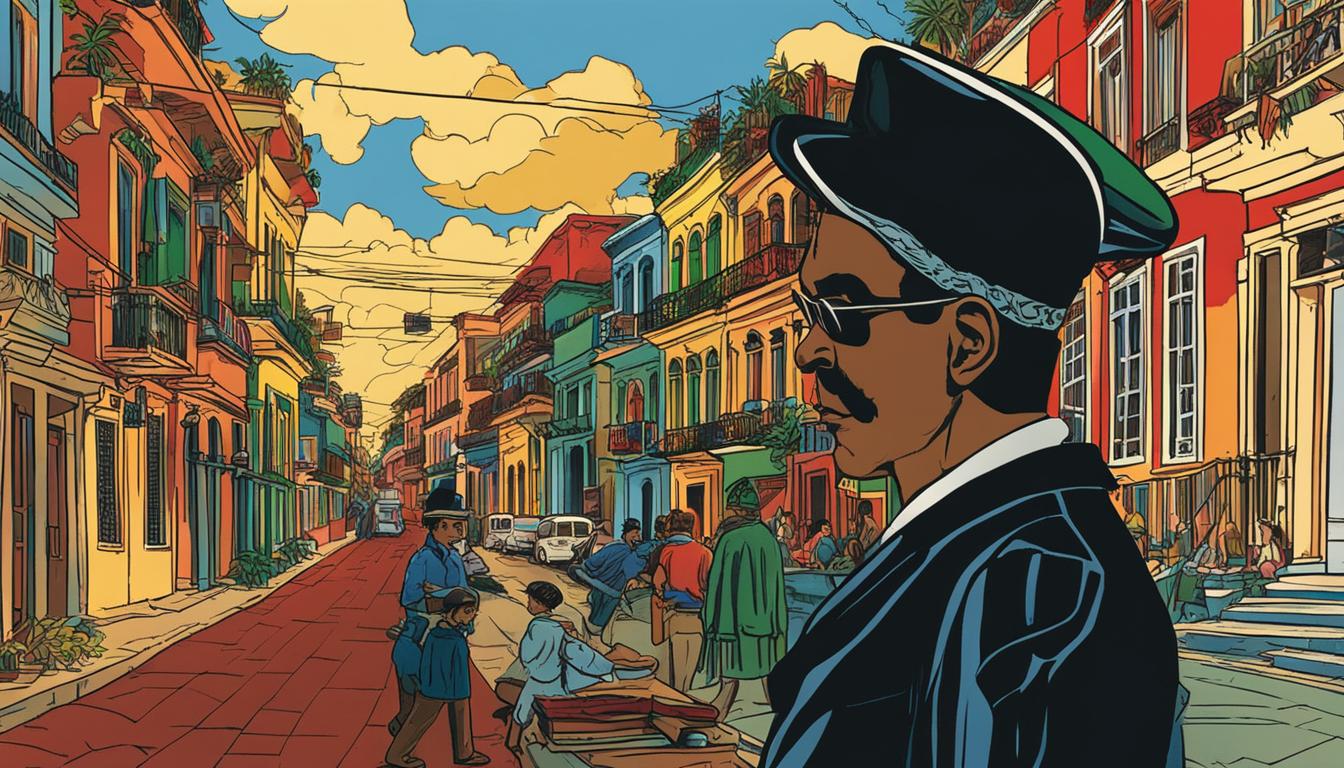In his Pulitzer Prize-winning memoir, “Waiting for Snow in Havana: Confessions of a Cuban Boy,” Carlos Eire takes readers on a poignant journey through his childhood as a Cuban boy during a tumultuous time in the nation’s history. Eire’s moving prose captures the essence of his experiences, evoking empathy and reflection within readers.
Key Takeaways
- “Waiting for Snow in Havana” is a memoir written by Carlos Eire and has won a Pulitzer Prize.
- The book follows Eire’s experiences as a Cuban boy during a chaotic period in Cuba’s history.
- Eire’s storytelling evokes empathy and reflection within readers.
- The memoir explores themes such as loss, transformation, identity, and resilience.
- “Waiting for Snow in Havana” has had a significant impact on literature about Cuba and the immigrant experience.
About the Author, Carlos Eire
Carlos Eire is a renowned author and professor of history and religious studies at Yale University. Born in Havana, Cuba, Eire migrated to the United States in 1962 as part of the Operation Pedro Pan airlift. His experiences as a Cuban boy and immigrant heavily influence his written works.
Eire’s writing style is known for its vivid imagery and introspective approach. He has written several books and memoirs, including Learning to Die in Miami: Confessions of a Refugee Boy and A Very Brief History of Eternity.
“Writing is my way of making sense out of life,” Eire said in an interview with the Yale Daily News. “And it is also my way of keeping the immigrants’ dream alive.”
Notable Works by Carlos Eire
| Title | Published | Awards |
|---|---|---|
| Waiting for Snow in Havana: Confessions of a Cuban Boy | 2003 | Pulitzer Prize for Biography or Autobiography |
| Learning to Die in Miami: Confessions of a Refugee Boy | 2010 | Winner of the National Book Award for Nonfiction |
| A Very Brief History of Eternity | 2010 |
Eire’s works have received critical acclaim and have contributed greatly to the literature of Cuba and the immigrant experience.
Introduction to “Waiting for Snow in Havana”
Carlos Eire’s Pulitzer Prize-winning memoir, Waiting for Snow in Havana: Confessions of a Cuban Boy, takes readers on a thought-provoking journey through the eyes of a young Cuban boy. The memoir captures the essence of his life and the world around him, allowing readers to experience his struggles and triumphs.
The book is a poignant representation of the immigrant experience, providing insight into the challenges faced by those who are uprooted from their homes and thrust into unfamiliar environments. Eire’s writing style is gripping and evocative, drawing readers in and immersing them in the world he so masterfully creates.
Whether the reader is well-versed in Cuban history or completely unfamiliar with the country, Waiting for Snow in Havana provides a captivating window into the soul of a nation and the experiences of those who have called it home. Through powerful prose and vivid imagery, Eire’s memoir delivers a message of hope, resilience, and the human spirit’s unyielding capacity to endure.
“Carlos Eire’s memoir, Waiting for Snow in Havana, is a profound and moving work of art that transports readers to another world and immerses them in the human experience.”
Setting and Historical Context
The setting of “Waiting for Snow in Havana” is Havana, Cuba, during the 1950s and 1960s, a time of great political and social turmoil. This was the era of Fidel Castro’s revolution, which transformed Cuba into a communist state, fundamentally changing the country and its people.
The memoir recounts the author’s childhood experiences in Havana before he and his brother were sent to Miami as part of Operation Pedro Pan, a mass exodus of Cuban children organized by the Catholic Church in response to the political upheaval.
The historical context of the memoir is defined by the complex socio-political landscape of Cuba. The country was a battleground of competing global powers, with the United States exerting hegemonic influence in the region while simultaneously supporting the corrupt regime of Cuban dictator, Fulgencio Batista.
Carlos Eire’s account captures the spirit of Havana during this time of great change and upheaval. His vivid descriptions of the city and its people provide a snapshot of a world that no longer exists, evoking a deep sense of nostalgia and loss.
“The city was alive with color and sound, with laughter and music and voices and rumbling engines and the clatter of hoofbeats and the wail of sirens and the creaking of bicycles. Havana was a city in motion, a city of contradictions, a city in love with life.”
Eire’s memoir is not only a personal account of his experiences, but also a reflection on the broader historical forces that shaped his life and the lives of all Cubans during this time of profound transformation. It offers a unique window into a pivotal moment in history and the ways in which ordinary people were affected by it.
Themes Explored in “Waiting for Snow in Havana”

Throughout the memoir, “Waiting for Snow in Havana,” Carlos Eire explores various themes that shed light on the human experience. Loss and transformation are prevalent throughout the book, as he navigates the turmoil of leaving his home country and starting anew in America. Eire’s journey of self-discovery also delves into themes of identity and belonging, as he grapples with reconciling his Cuban and American roots.
“The house is gone, but the memories endure…A journey through time and space—and so much more.”
Eire also explores the theme of resilience, as he overcomes numerous challenges throughout the course of his life. Despite facing adversity, he maintains the courage to rebuild and move forward. These themes intertwine throughout the memoir to form a complex exploration of the human condition.
Key Characters
“Waiting for Snow in Havana” delves into the life of the author, Carlos Eire, and his family in Cuba before and after the revolution. Throughout the memoir, various characters play a significant role in shaping Eire’s experiences and worldview. In this section, we will take a closer look at some of the key characters in the book:
| Name | Description |
|---|---|
| Carlos Eire | The protagonist of the story and the youngest child in the Eire family. Eire’s journey towards exile is at the center of the memoir. |
| Mima | Eire’s beloved grandmother who instills in him a love for family and his cultural heritage. |
| Freddie | Eire’s childhood best friend who supports him through his struggles growing up in 1950s Cuba. |
| Father Laurence | The Catholic priest who helps Eire escape to the United States and supports him throughout his journey as a refugee. |
Each character has a unique impact on Eire’s life and contributes to the richness and depth of the memoir. Carlos Eire’s vivid portrayal of these individuals draws readers in and makes them invested in the story of “Waiting for Snow in Havana.”
Emotional Impact of the Memoir
“Waiting for Snow in Havana” is a powerful memoir that evokes a profound emotional impact on its readers. The book lays bare the complex emotions Carlos Eire experienced during his childhood in Cuba, transporting readers to a world of loss, uncertainty, and transformation.
Eire’s brutally honest storytelling and vivid descriptions of life in Havana resonate with readers on a deep level, evoking empathy and compassion for those who have experienced similar hardships. The memoir challenges readers to reflect on their own lives, relationships, and experiences, inspiring a deeper understanding of what it means to be human.
The emotional impact of “Waiting for Snow in Havana” extends beyond its readers, earning praise and recognition from literary critics. The memoir has won numerous awards, including the Pulitzer Prize for Biography in 2003, cementing its place in the canon of great memoirs.
Critical Reception and Awards
Since its publication, “Waiting for Snow in Havana” has received widespread critical acclaim and numerous accolades, cementing its place as a timeless memoir.
| Award | Year |
|---|---|
| Pulitzer Prize for Biography or Autobiography | 2003 |
| National Book Award Finalist in Nonfiction | 2003 |
| Chicago Tribune Heartland Prize for Nonfiction | 2003 |
| Book Sense Book of the Year Award for Adult Nonfiction | 2003 |
Carlos Eire’s memoir has captivated readers and critics alike, earning praise for its poignant storytelling, vivid imagery, and honest portrayal of personal and political struggles. It has been praised as a “masterpiece of autobiographical writing” by The New York Times, and is considered a must-read for anyone seeking a deeper understanding of Cuban history and culture.
“Waiting for Snow in Havana is heartbreaking, beautiful, and deeply informative. Eire’s resilient spirit shines through every page of this Pulitzer Prize-winning memoir, reminding us of the power of storytelling to heal, transform, and inspire.”
Significance and Legacy
The significance of “Waiting for Snow in Havana” lies in its ability to immerse readers in the vivid and complex world of Carlos Eire’s childhood in Cuba. Through a masterful blend of personal anecdotes and historical context, Eire gives readers a glimpse into a world that is at once exotic and deeply human.
But beyond its literary merits, “Waiting for Snow in Havana” has also become an emblem of the immigrant experience. Eire’s journey from Cuba to the United States is one that many can relate to, and his memoir has become a touchstone for those seeking to understand their own struggles as newcomers to a foreign land.
The legacy of “Waiting for Snow in Havana” is perhaps best seen in its enduring popularity. More than twenty years after its publication, the book remains a fixture on school reading lists and book club rosters alike, a testament to its lasting relevance and resonance.
“This is a book that will live forever in the annals of Cuban literature, a book that will be read by generation after generation of Cubans and non-Cubans alike.” – Oscar Hijuelos, author of “The Mambo Kings Play Songs of Love”
Conclusion
In conclusion, “Waiting for Snow in Havana: Confessions of a Cuban Boy” by Carlos Eire is a Pulitzer Prize-winning memoir that offers a compelling perspective on the immigrant experience. Through his vivid storytelling, Eire takes readers on a journey through his childhood in Cuba and his subsequent transformation as a refugee in America. The memoir explores themes such as loss, identity, and resilience, making it a poignant and emotional read.
The significance of “Waiting for Snow in Havana” lies in its ability to offer a unique perspective on the Cuban Revolution and its aftermath. Eire’s memoir serves as a reminder of the human cost of political upheaval and displacement. Moreover, it highlights the power of resilience and hope in the face of adversity.
The critical reception and awards that “Waiting for Snow in Havana” has received are a testament to its impact on both the literary world and readers. Eire’s ability to evoke a deep emotional connection with his readers has made this memoir a classic in its own right.
In summary, “Waiting for Snow in Havana” is a profound and moving memoir that resonates with readers on a personal level. It is a testament to the resilience of the human spirit and the power of hope in the face of adversity.



